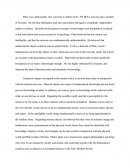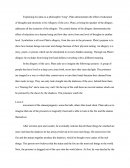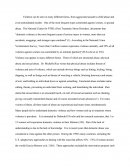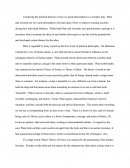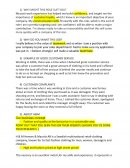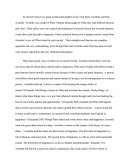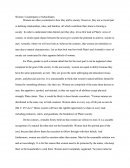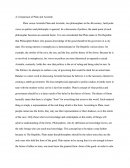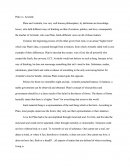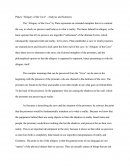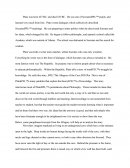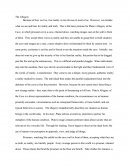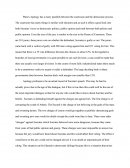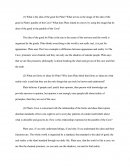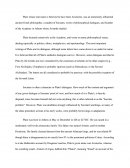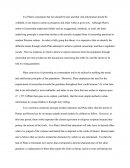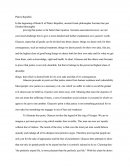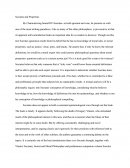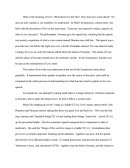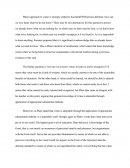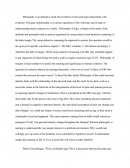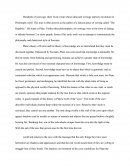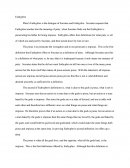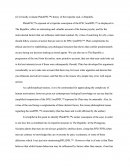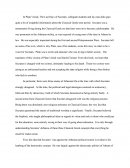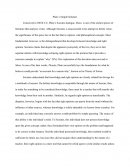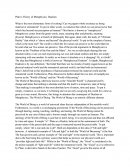Philosophy
There are many popular essays and research papers on Philosophy on Essays24.com.
You can view research papers and essays or use search engine.
1,165 Philosophy Free Essays: 781 - 810
-
Plato
Plato was a philosopher who was born in Athens (470- 390 BCE), and was also a student of Socrates. He felt that intelligence and one's perception belonged to completely independent realms or realties. He believed that general concepts of knowledge were predestined, or placed in the soul before birth even
Rating:Words: 351 • Pages: 2 -
Plato
Explaining his ideas as a philosopher "king", Plato demonstrates the effect of education of thoughts and emotions in his Allegory of the cave. Plato, as being the speaker of the allegory, addresses all the scenarios of the allegory. The central theme of the allegory demonstrates the effect of education on
Rating:Words: 1,096 • Pages: 5 -
Plato
Violence can be seen in many different forms, from aggravated assault to child abuse and even premeditated murder. One of the most frequent types committed against women, is spousal abuse. The National Center for PTSD, (Post Traumatic Stress Disorder), documents that "domestic violence is the most frequent cause of serious
Rating:Words: 3,900 • Pages: 16 -
Plato Analysis
The Miserable Tyrant is the Worst of Souls Plato's The Republic centers on a simple question: is it better to be just than unjust? In answering this overlying question, Socrates outlines the ideal city and how justice is a virtue of that city. From there, he characterizes justice as a
Rating:Words: 1,646 • Pages: 7 -
Plato And Aristotle: A Comparison
Comparing the political theories of any two great philosophers is a complex task. Plato and Aristotle are two such philosophers who had ideas of how to improve existing societies during their individual lifetimes. While both Plato and Aristotle were great thinkers, perhaps it is necessary first to examine the ideas
Rating:Words: 1,673 • Pages: 7 -
Plato Republic
1. WHY MIGHT THIS ROLE SUIT YOU? My past work experience has helped me build confidence, and taught me the importance of customer loyalty, which I know is an important objective of your company. My communication skills fit exactly with this role, which is the sort of role I am
Rating:Words: 363 • Pages: 2 -
Plato Vs Aristotle
In ancient Greece two great written philosophers lived. First there was Plato and then Aristotle. Aristotle was a pupil of Plato. Despite being taught by Plato they had different theories and views. Their ethics were very typical and traditional of ancient Greece but Aristotle detailed virtue ethics and the path
Rating:Words: 1,825 • Pages: 8 -
Plato Vs Aristotle's View Of Women
Women: Counterparts or Subordinates Women are often overlooked in how they add to society. However, they are a crucial part in defining relationships, roles, and families, all which contribute their share to forming a society. In order to understand what distinct part they play, let us first look at Plato's
Rating:Words: 1,370 • Pages: 6 -
Plato Vs. Aristotle
A Comparison of Plato and Aristotle Plato versus Aristotle Plato and Aristotle, two philosophers in the 4th century, hold polar views on politics and philosophy in general. In a discussion of politics, the stand point of each philosopher becomes an essential factor. It is not coincidental that Plato states in
Rating:Words: 1,867 • Pages: 8 -
Plato Vs. Socrates
Plato vs. Aristotle Plato and Aristotle, two very well known philosophers, by definition are knowledge lovers, who held different ways of thinking on that of creation, politics, and love, consequently the teacher of Aristotle, who was Plato, holds different views on all of those matters. Creation, the beginning process of
Rating:Words: 496 • Pages: 2 -
Plato's "Allegory Of The Cave" - Analysis And Summary
Plato's "Allegory of the Cave" - Analysis and Summary The "Allegory of the Cave" by Plato represents an extended metaphor that is to contrast the way in which we perceive and believe in what is reality. The thesis behind his allegory is the basic opinion that all we perceive are
Rating:Words: 977 • Pages: 4 -
Plato's Allegory Of The Cave
Plato was born 427 BC, and died 347 BC. He was one of Socrates’ pupils, and learned very much from him. Plato wrote dialogues which collectively described Socrates’ teachings. He was preparing to enter politics when he discovered Socrates and his ideas, which changed his life. He began to follow
Rating:Words: 3,624 • Pages: 15 -
Plato's Allegory Of The Cave Compared To The Human Condition
The Allegory Because of how we live, true reality is not obvious to most of us. However, we mistake what we see and hear for reality and truth. This is the basic premise for Plato's Allegory of the Cave, in which prisoners sit in a cave, chained down, watching images
Rating:Words: 1,044 • Pages: 5 -
Plato's Apology
Plato's Apology has a many parallels between the courtroom and the democratic process. The courtroom has many things in similar with elections and as such it offers a good look into both Socrates' views on democratic politics, public opinion and truth between both politics and public opinion. Even the size
Rating:Words: 1,365 • Pages: 6 -
Plato's Cave
(1) What is the idea of the good for Plato? What serves as the image of the idea of the good in Plato's parable of the Cave? What does Plato intend to convey by using the image that he does of the good in the parable of the Cave? The
Rating:Words: 1,473 • Pages: 6 -
Plato's Life And Events
Plato whose real name is believed to have been Aristocles, was an immensely influential ancient Greek philosopher, a student of Socrates, writer of philosophical dialogues, and founder of the Academy in Athens where Aristotle studied. Plato lectured extensively at the Academy, and wrote on many philosophical issues, dealing especially in
Rating:Words: 641 • Pages: 3 -
Plato's Myths
It is Plato's conception that lies should be told, and that vital information should be withheld, if one hopes to achieve prosperity and order within a given city. Although Plato's notion of censorship might merit labels such as exaggerated, unethical, or cruel, the basic underlying principle is somewhat similar to
Rating:Words: 1,888 • Pages: 8 -
Plato's Republic Summary Books 2-7
Plato's Republic In the beginning of Book II of Plato's Republic, ancient Greek philosopher Socrates has just finished thoroughly proving that justice is far better than injustice. Socrates associates however, are not convinced challenge him to give a more detailed and further explanation as to justice's worth. Glaucon, states that
Rating:Words: 2,138 • Pages: 9 -
Plato's Socrate
Socrates and Properties By Characterizing himself Ð'-Socrates- as both ignorant and wise, he presents us with one of the most striking paradoxes. Like so many of the other philosophers, is provocative in that its apparent self-contradiction hides an important idea for us readers to discover. Though out this text Socrates
Rating:Words: 3,238 • Pages: 13 -
Plato's Symposium
What is the meaning of love? What does love feel like? How does love come about? No one can truly explain it, yet somehow it's understood. In Plato's Symposium, a dinner party was held with the discussion of love as the main topic. Everyone was required to make a speech,
Rating:Words: 1,875 • Pages: 8 -
Plato's Symposium Analysis
"Plato's Symposium" Kaboom, that was the sound of Zeus's thunder crashing towards the Earth. During this time period the people in Greece believed in these gods. Also happening at the same time period was when the worlds most famous philosophers began to come out and teach. Most importantly the philosophers
Rating:Words: 3,274 • Pages: 14 -
Plato's Tripartite Soul - Discussion And Evaluation
In Plato’s, Phaedrus, Plato describes what has become known as the Tripartite Soul which describes the human soul as having three parts corresponding to the three classes of society in a just city. Individual justice consists in maintaining these three parts in the correct power relationships, which reason ruling, spirit
Rating:Words: 1,218 • Pages: 5 -
Plato's Virtue
Plato's approach to virtue is strongly related to SocratesÐ'ЃEserious dilemma: how can we ever learn what we do not know? There may be two alternatives for this question's answer: we already know what we are looking for, in which case we don't need to look, or we don't know what
Rating:Words: 810 • Pages: 4 -
Plato, Pojmen
Philosophy is an attempt to study the existence of man and mans relationship with existence. The goal of philosophy is to answer questions of life with facts and in hope of understanding mans existence as a whole. Philosophy of logic is based on the study of the methods and principles
Rating:Words: 1,833 • Pages: 8 -
Plato: The Philosopher
Hundreds of years ago, there lived a man whose ideas and writings started a revolution in Philosophy itself. This man is often known as the author of a famous piece of writing called "The Republic." His name is Plato. Unlike other philosophers, his writings were in the form of dialogs
Rating:Words: 1,006 • Pages: 5 -
Platos Euthyphro
Euthyphro Plato's Euthyphro is the dialogue of Socrates and Euthyphro. Socrates requests that Euthyphro teaches him the meaning of piety, when Socrates finds out that Euthyphro is persecuting his father for being impious. Euthyphro offers four definitions for what piety is, all of which are analyzed by Socrates, and then
Rating:Words: 788 • Pages: 4 -
Platos Tripartite Soul
(2) Critically evaluate Plato’s theory of the tripartite soul, in Republic. Plato’s espousal of a tripartite conception of the �soul’ as displayed in The Republic, offers an interesting and valuable account of the human psyche, and for the motivational factors that can influence individual conduct. By virtue of searching for
Rating:Words: 2,516 • Pages: 11 -
Plato’s Book Review - the Last Days of Socrates
In Plato’s book, The Last Days of Socrates, collegiate students and lay man alike gain quite a bit of insightful information about the Classical Greek time period. Socrates was a stonemason living during the Classical Greek era that later went on to become a philosopher. He was prominent in
Rating:Words: 1,325 • Pages: 6 -
Plato’s Simple Solution
Plato’s Simple Solution Conceived in 380 B.C.E, Plato’s Socratic dialogue, Meno, is one of the earliest pieces of literature that analyzes virtue. Although Socrates is unsuccessful in his attempt to define virtue, the significance of this piece lies in the fact that it explores vital philosophical concepts. Most fundamental, however,
Rating:Words: 1,231 • Pages: 5 -
Plato’s Theory of Metaphysics: Dualism
Plato’s Theory of Metaphysics: Dualism What is the most elementary form of existing? Can we pigeon whole existence as being material or immaterial? To put in other words, is existence that which we can perceived or that which lies beyond our perception as humans? This theory is known as “metaphysics”.
Rating:Words: 774 • Pages: 4
